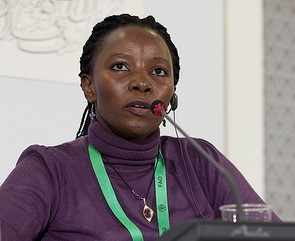By Nimisha Bastedo

How can we make sure that the decisions that are made here actually have an impact?
This was the central question during the side event yesterday morning that was called “Towards the Innovative monitoring mechanism of the CFS”.
The special Rapporteur on the right to food, Olivier de Schutter, talked about the risk of reducing the CFS into a “talk shop” if there aren’t clear, “rights-based and participatory” ways of monitoring the extent to which all the talk has translated into policies and practice on the ground.
Olivier’s suggestion was to establish a sort of “peer review” system, where all the countries within a region could work together to report on success stories and challenges. He stressed that they should not only be looking at results (in terms of fewer hungry people), but also at the efforts countries are making “to involve the victims of hunger” into their monitoring and policy-making decisions.
Margaret Nakato from the World Food Forum of Fish Harvesters and Fish Workers spoke about the important role of social movements in any monitoring strategy. She began by explaining how social movements have the essential on-the-ground networks for teaching people about the agreements that have been made at the CFS. She asked: “How can we monitor something that people don’t know about?”
Margaret also emphasized that we can’t monitor food security just by counting the hungry. She said that we also need qualitative information, in the form of community case studies for example, and that social movements are in the best position to make this happen.
The panelists made it clear that we do not need to start from scratch. There are many good, existing examples of monitoring systems. On paper, the CFS has already agreed on some progressive principles for monitoring the impact of their decisions. The task at hand now is to make sure these principles are getting from the paper into national priorities. Otherwise, there is a risk that all that is discussed and agreed upon here will only stay in Rome.